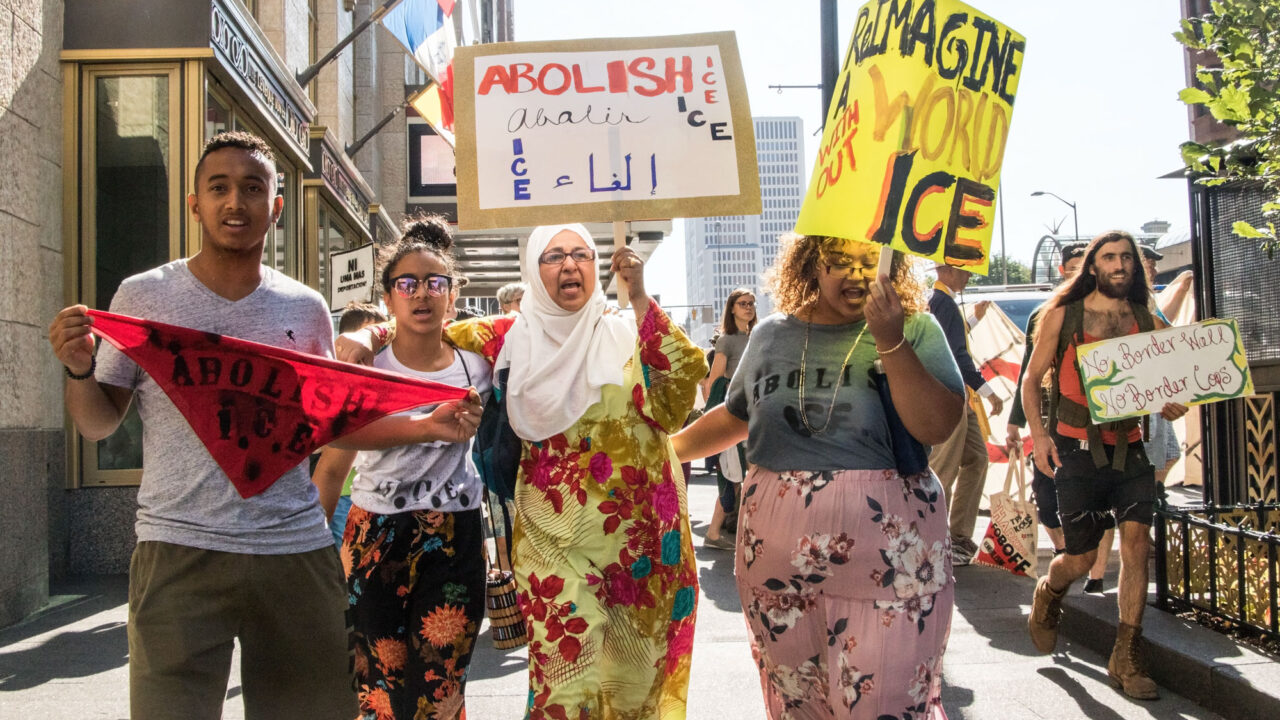Angélica Cházaro argues that the Migrant Justice movement and the Abolitionist movement must be intertwined because the system of oppression they face is one and the same.
Abolition demands a world where no one is disposable, a world where we dismantle the institutions that sort groups of people into those who will live and thrive and those who will be left to die. Migrant justice demands the same.
Migrant justice and abolition both require us to organize toward a world where potential rescuers would not have merely looked on as over 700 migrants drowned in the Mediterranean sea because they were charged with guarding European national borders against people deemed “outsiders” undeserving of entry, the same month that no expense was spared to rescue five wealthy men attempting to visit a shipwreck for fun. They both require us to build a world where it would be unthinkable for cities and states in the U.S. to spend more federal pandemic relief dollars on hiring cops charged with tracking down and keeping migrants out than on ensuring everyone has a home and enough to eat. There is a direct through line between the default response to domestic social crises being more cops and cages and the default response to global climate-induced migration being the increasing militarization of the border. Abolitionist organizing disrupts the structures that enable and benefit from this default response.
The Trump administration’s war on migrants represented the most recent historical example of elected officials bringing out into the open the xenophobic rhetoric that has always undergirded US immigration policy. While Biden may have curbed some of the excesses of the Trump years, over 4 million people have still been apprehended, deported, and expelled since Biden took office. Biden’s softer rhetorical stance towards migrant communities has provided him cover even as he grows traditional immigration detention and dramatically expands ICE’s digital prisons, more than doubling the number of immigrants under electronic surveillance since he took office. It should come as no surprise that the same administration overseeing the growth of immigration apprehension, incarceration, and expulsion would wholeheartedly reject the call to “defund the police” and instead put hundreds of millions of federal dollars towards hiring more local cops. As Biden continues to bloat local police budgets with tax dollars, he is testing surveillance practices on migrants that have the potential to be used for continuous monitoring and control of everyone in the US, including US citizens.
As an active abolitionist organizer with roots in migrant justice movements, I see no analytical or tactical distance between organizing to defund the Seattle Police Department, shut down local jails, and end immigrant detention and deportation in Washington State. Across the country, organizers working at these intersections continue to push to defund local police departments and redirect the funds currently poured into punishment towards our collective well-being, even as others fight to shrink the bloated budgets of Immigration and Customs Enforcement (ICE) and Customs and Border Protection (CBP) –– the immigration cops who make up the nation’s largest and best funded police force. In Seattle, we have been organizing to stop our city council from adding drug possession and drug use as punishable offenses to our local municipal code. We fight because we know the war on drugs has failed us all and has had a particularly brutal impact on Black communities. We fight because despite making up only 7 percent of the non-citizen population, Black immigrants represent over 20% of those facing deportation on criminal grounds like drug possession. We fight in our local cities and towns alongside the criminalized migrant communities already here and for those yet to be displaced to our communities. Fight by fight, we seek to dismantle the very conditions that subject communities to surveillance, policing, incarceration, and deportation to begin with.
Because we know that state prisons act as pipelines to immigrant detention centers we fight to #FreeThemAll. At the same time, we fight to shut down local immigrant detention centers, knowing that ICE is less likely to round up our community members in the absence of these facilities. When the day comes that the Northwest Detention Center in Tacoma, Washington finally shuts down, police officers in this and neighboring states will become less likely to collaborate with ICE to detain and deport immigrants knowing there is no conveniently located immigration prison to cage them. And because we know that a cage is a cage no matter its stated purpose, we fight so that our local campaigns to empty jails, prisons, and detention centers don’t lead to the same cages being repurposed to hold a different set of humans.
Abolitionist organizing demands that we recognize these fights as deeply connected and that they require growing and flexing the solidarity muscles that are crucial to surviving the challenges the coming decades will bring. Seeing organizing for migrant justice and abolition as the same fight means making transformative demands and fighting to win local campaigns that confront an international racial bordering regime. As we face both rising fascism and rising seas we must remember that the same commitments are required for confronting both: a commitment to refusing to abandon each other to suffering and early death, even as we build our capacity to imagine and build new ways of being with each other in the ashes of the old.

